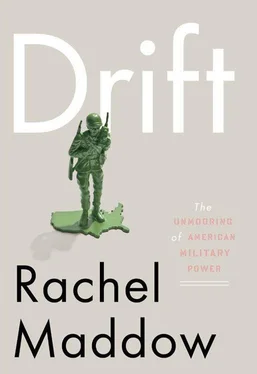By the time the Canal treaty made it to the Senate floor for ratification, Reagan’s histrionics had almost torpedoed the thing, aided by millions of desperate, pants-on-fire direct-mail appeals from the Conservative Caucus, and by the American Conservative Union’s “documentary” with the self-parodying title “There Is No Panama Canal… There Is an American Canal in Panama.” “This may be the most important TV program you’ve ever watched,” an ACU spokesman blared on the eve of the broadcast. What should have been a slam-dunk ratification became an act of political courage in the Senate. Reagan and his growing right-wing “truth” machine had stirred public opinion to such a frothy head that Senate Minority Leader Howard Baker was warned that a vote for the treaty would cost him any chance at the GOP presidential nomination in 1980. On the way to the Senate floor to cast his aye vote, a popular centrist Democrat from New Hampshire asked his wife to “come on and watch me lose my seat.”
The treaty squeaked through by a single vote, but it gave Reagan and the right wing of the Republican Party an issue that kept on giving. The next two election cycles were bloodbaths for the Senate Democrats. That New Hampshire senator lost his seat; so did the treaty’s floor manager, four-term senator Frank Church, who could not overcome a last-minute conservative ad blitz funded by the National Conservative Political Action Committee: “Now that all the shouting is over, remember the Panama Canal, built with American blood and treasure. Frank Church voted to give it away.” Birch Bayh of Indiana lost to a callow, lightweight Republican named Dan Quayle, and the 1972 presidential nominee George McGovern lost his South Dakota seat in an embarrassing 58–39 landslide.
But the Reagan assault didn’t stop at the party line. A slew of moderate Republicans who had supported the treaty were swept aside for being weak-kneed, such as Kansan James B. Pearson, who retired amid catcalls that he was not “Republican enough,” and old lions like Clifford Case and Jacob Javits, who lost ignominiously in the primary to a county supervisor from Long Island named Alfonse D’Amato. In November 1980, when Republicans gained control of the Senate for the first time since the end of 1954, this was not your father’s Republican Party. The Senate newbies were amped up, doctrinaire, undistracted by facts on the ground, and primed for a fight in which America could prove itself mighty once again. And at the head of the parade was the new president-elect, Ronald Wilson Reagan.
• • •
Just a few months before Ronald Reagan became America’s fortieth president, a former director of the White House Military Office wrote a book revealing the contents held within the world’s most terrifying valise, America’s “nuclear football.” They included an eight-to-ten-page list of secure and comfortable accommodations available to the president in the event of nuclear war; a black book full of cartoonish illustrations, with a constantly updated menu of retaliation possibilities (“Rare,” “Medium,” and “Well-Done”) thoughtfully highlighted in red; and a simple three-by-five-inch recipe card with the authentication codes the president needed to unleash our nation’s full lethal fury.
Protocol regarding the nuclear football was well established by the time Reagan entered the White House. The military aide carrying the Zero Halliburton briefcase for the day was tasked to stick close to the president. The first reason was operational. Our commander in chief had to have that case at the ready at all hours, with the authentication codes easy to find, just in case. At a moment’s notice, the president could dial up anything from “firing a tactical nuclear weapon, one of them,” remembered a later nuclear-football-toting aide, “to full-bore Armageddon.” The second reason for full-time proximity was more in the realm of public relations. Photojournalists were always snapping pictures of the president, so the Soviets were certain to get constant pictorial reminders that our nuclear button was never beyond reach. Consequently, White House military aides saw a lot of the president, which perhaps bred a certain amount of familiarity, which could be why one aide, John Kline, wondered aloud if maybe Ronald Reagan was doing something out of line. Kline noticed that his boss was saluting members of the armed forces. Soldiers were supposed to salute their president; the president was not supposed to salute the soldiers. No modern president, not even old General Eisenhower, had saluted military personnel. It might even be, well, sort of, improper. Reagan seemed disappointed at this news. Kline suggested he talk to the commandant of the United States Marine Corps and get his advice, and the commandant’s advice ran something like this: You’re the goddamn president. You can salute whoever you goddamn well please . So Ronald Reagan continued saluting his soldiers, and he encouraged his own vice president and successor, George H. W. Bush, to do the same. And every president since has followed.
Ronald Reagan loved the military; even long after he left the presidency he was still extolling the virtues of martial efficiency as compared to the federal government’s bloated, bureaucrat-driven civil service system. When he saluted the military, Reagan really meant it. He’d been a soldier himself, he’d sometimes remind people, a captain in fact, with a pretty high security clearance. Way back in 1937, Reagan had done the patriotic thing and signed up as a reserve officer in the US Army Cavalry. Because of the actor’s debilitating nearsightedness, the Reserves had deemed Reagan capable of only “limited duty.” But then, after Pearl Harbor, and just as his movie career seemed finally to be taking off, the cavalry unceremoniously plucked him out of his $5,000-a-week job as a contract player at Warner Bros. and sent him to a San Francisco supply depot loading ships bound for Australia. Lt. Reagan never complained. His country was at war and this was what he’d signed on for.
The Army physical didn’t do much for Reagan’s self-esteem, as he described it in one of his autobiographies: “One of the doctors who was administering the test told me after checking my eyes that if they sent me overseas, I’d shoot a general. The other doctor said, ‘Yes, and you’d miss him.’ My report read: ‘Confined to the continental limits, eligible for corps area service command or War Department overhead only.’ ” He’d be good for pushing paper, in other words, and that was about it.
As luck would have it, Reagan’s old studio boss, Jack Warner, had just been sworn into the Army as a lieutenant colonel, though unlike Lt. Reagan, Warner got to keep drawing his civilian salary. Warner’s orders were to stand up a movie-making team within the Army Air Corps. The First Motion Picture Unit, Fum-Poo in Army acronym speak, would be responsible for the Air Corps’ total celluloid output, from combat photography of bombing runs to full-blown rah-rah morale-building motion pictures to training films for pilots and their crews such as Aircraft Wood Repair: Parts 1 thru 4; Uncrating and Assembly of the Thunderbolt Airplane; Oil Fires, Their Prevention and Extinguishment; and Land and Live in the Jungle and its sequels Land and Live in the Desert and How to Survive in the Arctic .
Warner needed men familiar with movie production. So two months into his tour at the port in San Francisco, Reagan received orders to report to the old Hal Roach Studios in Culver City for his new job as Fum-Poo’s personnel officer, where he could also moonlight as needed as an actor and narrator for the unit films. His commander in San Francisco, a career officer from Virginia Military Institute, was flabbergasted by Reagan’s new assignment. The Army had a long history of mismatching men and jobs, but Reagan’s assignment to the Army’s in-house movie studio was a move of exquisite logic and thoroughgoing good sense. “In thirty-four years, this is the first time I’ve ever seen the Army make sense,” said the colonel. “This is putting a square peg in a square hole.” Reagan might not have had great potential as a soldier, but few men were better equipped to perform the role of a soul-stirring make-believe soldier.
Читать дальше












